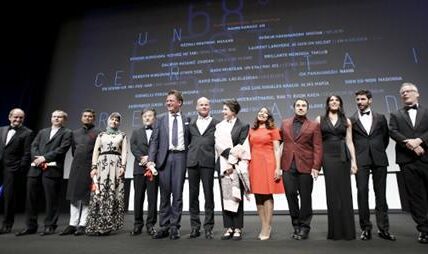Pieskowa Castle, Poland (Credit: fotopolska.com)
Polish film journalist Marcin J. Sobczak explains why the country is encouraging international film productions to take advantage of its many opportunities.
Located in the heart of Europe, Poland is a country of many contrasts, with a modern and rapidly developing film industry that has grown significantly ever since the country joined the European Union in 2004. Year by year, every sector of the Polish film market becomes more conscious and contemporary, and the result is a flexible movie industry, one that is open for change, opportunity and international cooperation.
In 2005, the Polish government created and approved the Cinematography Act, to regulate issues related to the financing of film production and project development, as well as sketch out the basic legal framework for the functioning of the country’s film market. Also founded under the act was the Polish Film Institute (PISF), tasked with supporting filmmakers both administratively and financially. Under the leadership of former deputy culture minister Agnieszka Odorowicz, the PISF has overseen a significant rise in both the quantity and quality of domestic features, with impressive results at the domestic box office and the international stage, thanks to wins at various international festivals. The PISF has also instituted a financial programme to aid the digitisation of Poland’s cinemas, bringing the country in line with emerging global trends.
Credit: fotopolska.pl
The PISF is not just tasked with overseeing Poland’s domestic industry, however. As a signatory to the European Convention on Cinematographic Co-Production, Poland is actively encouraging foreign filmmakers to its shores via a number of attractive international co-production treaties and public funding initiatives.
Incentives and Funding
Although Poland lacks any formal incentive programmes, the PISF does have an annual funding budget of approximately €34m with which to entice foreign filmmakers. In 2010, €22m of this figure was specifically set aside for production, an increase of 23 per cent on 2008’s budget, and 46 per cent on 2007’s allocation. Access to funding is relatively straightforward, with interested parties applying direct via an online application form. Filmmakers can also access a number of public grants awarded for production, festivals and events, education and professional training, along with the promotion of Polish film overseas.
International Co-Production
As a Eurimages member, Poland currently has co-production treaties with France, Canada, Israel and most recently, with Germany. Created by the Polish Film Institute, Medienboard Berlin-Brandenburg and Mitteldeutsche Medienfoerderung, this new co-development fund offers significant advances in collaboration between Polish and German co-producers by facilitating cooperation at the development stage of a project. Foreign filmmakers are not required to have any special permits to work in the country but, to be considered for the new co-production grant, an overseas production must partner with at least one Polish producer, and spend 80 per cent of the film’s budget in Poland. If the application is approved, the production company could receive a subsidy of up to 50 per cent of the total production budget, receiving half before shooting and the remainder after completion. The entire application process, including completion of all necessary paperwork, can now be done online.
Additional funding is also available from 9 regional film funds, each eager to attract productions to their regions. In order to qualify for these funds, productions need to show a clear commitment, possibly even at script level, to promoting the image of a specific region, its residents or businesses, or strive to have a positive impact on the local economy.
As the umbrella organization coordinating work between regional film commissions and regional film funds, Film Commission Poland is tasked with providing support for filmmakers who choose Poland as a shooting location. This ranges from practical information about the country and its customs, weather and transport, to help in securing shooting permits, location scouting and production logistics. It can also assist with contacting film producers, stakeholders, relevant government departments and the many private foundations and companies interested in investing in films shooting in Poland.
Alvernia Studios
Production Facilities
There are several modern facilities in Poland that offer high-quality services for all stages of film production. One of the country’s leading studios is Alvernia Studios, located just 30 minutes’ drive from Krakow. The complex features two large dome-shaped sound stages, each measuring 2,000 sq. metres, a number of smaller studios, on-site post-production and visual effects services and a wooded backlot for exterior shots. Recent productions include Amy Heckerling’s Vamps, Indian production Aazaan and Essential Killing, directed by Jerzy Skolimowski. At the time of writing, Alvernia had announced that their first co-production, the thriller Arbitrage starring Richard Gere, Tim Roth and Susan Sarandon, was to premiere at Sundance 2012. www.alvernia.com
Poland’s capital, Warsaw, also boasts two major studios. ATM Studio, opened in November 2011, is, at 14,000 sq. metres, one of the biggest facilities in Poland. It contains five sound stages and a large event venue for either film or television productions. www.en.atmgrupa.pl
Also located in Warsaw is WFDiF, which was originally opened in 1949 but has now been completely modernised. The studio has 30 units, including professional film and TV studios, sound stages, top-quality laboratories and hi-tech equipment www.wfdif.com.pl
In central Poland, Lodz’s Opus Film offers both full-service sound stages and highly talented crew. www.opusfilm.com As well as film studios, Poland houses a huge number of high-quality production companies, like post-production studio Platige Image founded by one of the country’s greatest animators Tomasz Baginski (www.platige.com), or the Warsaw-based Chimney Pot. www.chimney.pl
Locations
Facilities, favourable exchange rates and talented, professional crew aside, for many international productions filming in Poland, the country offers a unique opportunity to access some of Europe’s most diverse natural topographies, all within easy reach of international transport hubs.
From natural landscapes like the snow-covered mountains of the Malopolska region in the south, the majestic Baltic Sea, imposing forests, stunning lakes and picturesque villages, to urban hubs like Warsaw, the country’s modern capital, Wroclaw, with its medieval architecture and numerous bridges and Krakow, with its iconic Old Town, there are a plethora of options for filmmakers to explore. The country also boasts a number of unique and unexpected locations, such as the famous salt mine in Wieliczka, a huge underground complex of decorated chambers and chapels made entirely out of salt, and the moving sand dunes of Slowinski National Park in the north.
Flying Machine
Poland is clearly a country with a great deal to offer, and its emergence as one of Europe’s favoured co-production and financing partners is no coincidence. Progressive thinking by the PISF coupled with a strong filmmaking tradition—and national propensity for hard work—has put the country back on the international film production map.
Polish Animation and the Oscars
Polish animation looks set to enjoy another stellar year, with 11 of the 45 animation shorts originally chosen to compete in the 2012 Academy of Motion Picture Arts and Sciences Awards having been co-financed by the Polish Film Institute. Of these, two have been shortlisted for Oscar nomination: Zaczarowany fortepian (The Magic Piano) by Martin Clapp and Paths of Hate by Damian Nenow. Both films are part of the Flying Machine project, a collaboration between the UK’s BreakThru Films and Lodz-based Se-Ma-For studios, previously winners of an Academy Award in 2008 for their short, Piotrus i wilk (Peter & the Wolf), directed by Suzie Templeton.
Useful Industry Contacts
Polish Film Institute: www.pisf.pl
Film Commission Poland: www.filmcommissionpoland.pl
Lodz Film Commission: www.lodzfilmcommission.com
Krakow Film Commission: www.film-commission.pl
Silesia Film Commission: www.silesiafilm.com.pl












